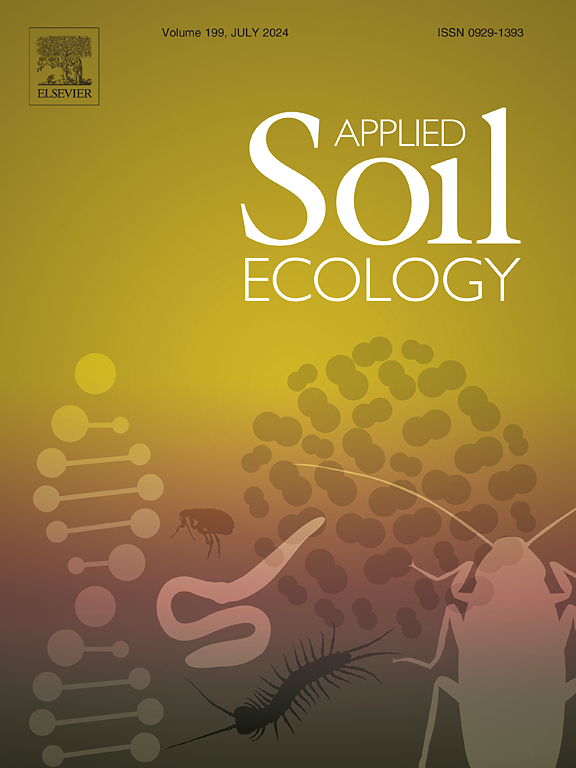Successive organic fertilizer substitution alleviated net ecosystem carbon loss in new vegetable field converted from rice paddy
IF 4.8
2区 农林科学
Q1 SOIL SCIENCE
引用次数: 0
Abstract
Soil disturbance caused by land-use change from rice paddies to vegetable fields can lead to substantial soil carbon (C) storage losses. Partial substitution of chemical fertilizers with organic forms is an effective strategy for sustainable agriculture and may compensate for this C loss. However, how different organic fertilizers and substitution ratios maintain the soil C balance (net ecosystem C budget, NECB) in newly converted vegetable fields remains unclear. Here, the effects of substituting 25 % and 50 % chemical nitrogen (N) fertilizers with pig manure and municipal sludge, respectively, on NECB were investigated by considering soil C inputs (net primary production (NPP) and organic fertilizers) and outputs (ecosystem respiration and harvesting) in a two-year field experiment with eight consecutive vegetable cultivation. Zero N fertilizer (ZeroN) and conventional chemical N fertilizer (ConN) were used as controls. Both control treatments exhibited negative NECB values, averaging −2072 and − 2137 kg C ha−1 yr−1 respectively, confirming substantial C losses in converted systems. Successive organic fertilizer substitutions significantly increased NECB by 73 %–208 % and reduced net global warming potential by 35 %–138 % relative to ConN, despite 21 %–32 % higher C outputs. Of these, 50 % substitutions achieved positive NECB through enhanced NPP and direct C inputs from organic fertilizers. Moreover, repeated organic fertilizer substitution induced dynamic microbial community restructuring, favoring the dominance of bacterial high-yield strategists (Y-strategists). Such shifts in life-history strategies enhanced NECB by directly mediating the C input-output balances, and closely linked to the increase of several of these enriched microbial taxa such as Proteobacteria, Bacteroidetes and Gemmatimonadetes. These findings elucidate the dual regulation of organic substitution on C cycling in converted vegetable systems through coupled biogeochemical-microbial mechanisms, emphasizing the critical role of microbial metabolic strategies in achieving sustainable agriculture and NetZero emissions.

连续有机肥替代缓解了稻田改造新菜田生态系统净碳损失
从稻田到菜地的土地利用变化引起的土壤扰动会导致大量的土壤碳(C)储量损失。用有机形式部分替代化肥是可持续农业的有效策略,可以弥补这一碳损失。然而,不同有机肥和替代比例如何维持新改造菜田土壤C平衡(净生态系统C预算,NECB)仍不清楚。通过考虑土壤C的输入(净初级生产量(NPP)和有机肥)和输出(生态系统呼吸和收获),研究了猪粪和城市污泥分别替代25%和50%化学氮(N)肥料对NECB的影响。以零氮肥(ZeroN)和常规化学氮肥(ConN)为对照。两种对照处理的NECB值均为负值,平均为- 2072和- 2137 kg C / ha - 1年- 1年,证实了转化系统中大量的C损失。与ConN相比,连续的有机肥替代显著增加了NECB 73% - 208%,降低了35% - 138%的净全球变暖潜能值,尽管碳产量增加了21% - 32%。其中,50%的替代通过提高NPP和有机肥料的直接碳输入实现了正的NECB。此外,重复的有机肥替代导致微生物群落动态重构,有利于细菌高产战略(y -战略)的优势。这种生活史策略的转变通过直接介导C输入-输出平衡而增强了NECB,并且与变形菌门、拟杆菌门和双胞菌门等这些富集的微生物类群的增加密切相关。这些发现阐明了有机替代通过生物地球化学-微生物耦合机制对转化蔬菜系统中碳循环的双重调控,强调了微生物代谢策略在实现可持续农业和净零排放中的关键作用。
本文章由计算机程序翻译,如有差异,请以英文原文为准。
求助全文
约1分钟内获得全文
求助全文
来源期刊

Applied Soil Ecology
农林科学-土壤科学
CiteScore
9.70
自引率
4.20%
发文量
363
审稿时长
5.3 months
期刊介绍:
Applied Soil Ecology addresses the role of soil organisms and their interactions in relation to: sustainability and productivity, nutrient cycling and other soil processes, the maintenance of soil functions, the impact of human activities on soil ecosystems and bio(techno)logical control of soil-inhabiting pests, diseases and weeds.
 求助内容:
求助内容: 应助结果提醒方式:
应助结果提醒方式:


